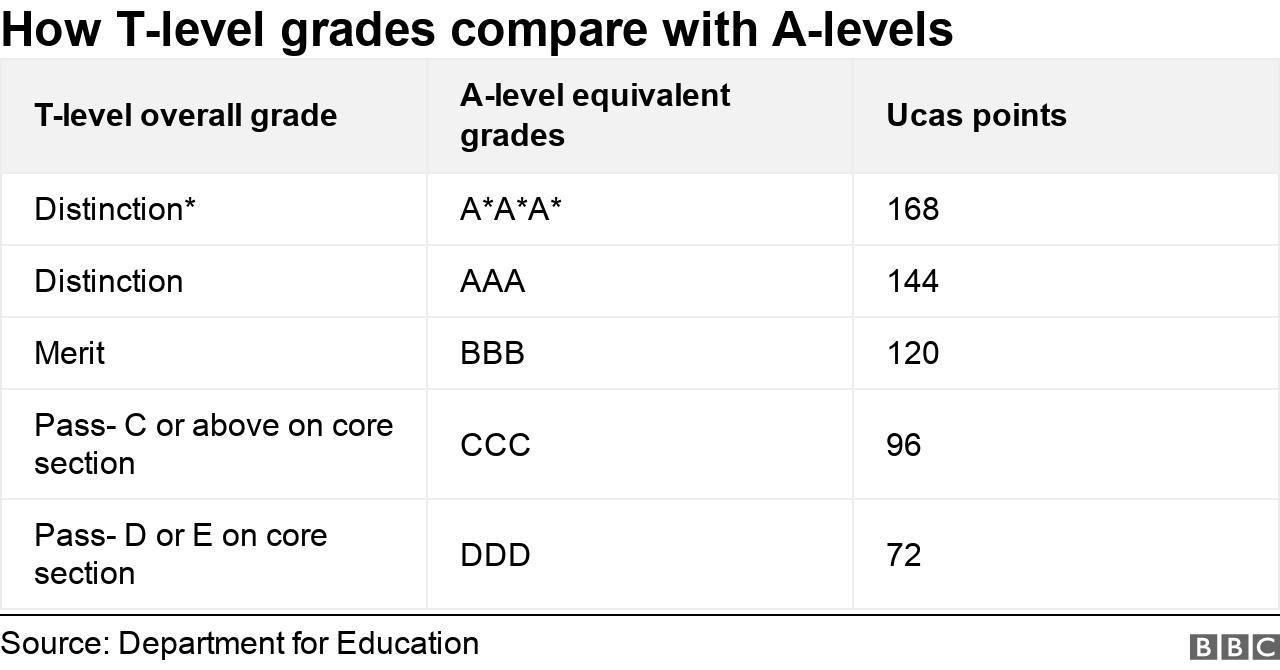What are T-levels and what are the grades worth?

- Published
GCSE students who have received their exam results may well be considering a T-level as their next step.
But what are T-levels, what courses are available and how are they marked?
What are T-levels, how are they marked, and what are they worth?
T-levels are vocational qualifications aimed at 16-to-19-year-olds in England, external, which focus more on practical subjects than academic ones.
Introduced in 2020, the qualification includes a mixture of classroom learning and on-the-job experience. A work placement of at least 315 hours - or nine weeks - makes up about 20% of the course.
T-levels are designed to cater for students who want an alternative to A-levels but do not wish to take an apprenticeship, which typically requires as much as 80% of a student's time to be spent with an employer.
Final marks are based on a combination of exams, coursework and completion of the industry placement.
Students get one of four grades, ranging from a pass to a distinction*. Their certificate shows their overall grade and lists their experiences on the course.
A distinction* is worth 168 Ucas points - the same as three A*s at A-level - and a merit is equivalent to three Bs at A-level.

For those wanting to go on to higher education, the DfE says T-levels are accepted as an entry qualification by more than 150 UK universities and colleges, external.
What T-level courses are available?
There are currently more than 20 T-Level subjects to choose from, external, including accounting, craft and design, engineering and media production.
Students will no longer be able to start a T-level in onsite construction. The DfE said this was due to low numbers of students taking it, adding that, external "the needs of learners and the economy are best met through apprenticeships and other classroom provision."
There have been delays to some courses becoming available, such as catering.
Some proposed T-levels have been scrapped all together, including hairdressing.
How successful are T-levels and what problems have there been?
The number of students taking T-levels has increased each year, and there were 25,508 entrants in the 2024-25 academic year.
The overall pass rate for the 7,262 students who received grades in July 2024 was 88.7%, down from 90.5% in 2023.
But many T-level students do not complete their course. Retention rates for most A-levels and other equivalent qualifications are consistently above 90%.
In comparison, only 71% of the 10,253 students who started a T-level in 2022 finished the two-year programme.
The dropout rate of first-year health and science T-level students was even higher at 31%, according to a report from the Education Policy Institute.
It said nearly half of those students end up leaving education altogether.
A third of students failed to finish legal, finance and accounting courses.
As well as problems with the range of available subjects, there have also been issues with the quality of teaching.
In July 2024, the exams watchdog Ofqual fined the NCFE exam board £300,000 over "major failings" with papers sat by 1,200 health and science T-level students in 2022.
How do T-levels compare to other vocational qualifications?
When T-levels were introduced by the previous Conservative government in 2020, there were more than 12,000 vocational qualifications, offered by more than 150 awarding bodies.
T-levels were designed to streamline this landscape, and make post-16 options less confusing for students and employers.
As part of the introduction of T-levels, funding was set to be withdrawn for some other vocational qualifications, like BTecs, which were deemed to "overlap" with the new T-level programmes.
However, the Labour government paused and reviewed the plans, and has since announced that 157 qualifications will no longer be scrapped as planned (although more than 200 others "with low or no enrolments" have had funding withdrawn from 1 August 2025).
The DfE said the qualifications would "be able to coexist" while work was done to make improvements, but that ultimately T-levels would become "the large technical qualification of choice".
Other vocational courses available in the UK include:
BTecs (available across the UK)
NVQs (available in England, Wales and Northern Ireland)
Scottish Vocational Qualifications (SVQs).

Have you taken a T-level? Tell us about your experiences. Email haveyoursay@bbc.co.uk, external.
Please include a contact number if you are willing to speak to a BBC journalist. You can also get in touch in the following ways:
WhatsApp: +44 7756 165803
Tweet: @BBC_HaveYourSay, external
Please read our terms & conditions and privacy policy
If you are reading this page and can't see the form you will need to visit the mobile version of the BBC website to submit your question or comment or you can email us at HaveYourSay@bbc.co.uk, external. Please include your name, age and location with any submission.